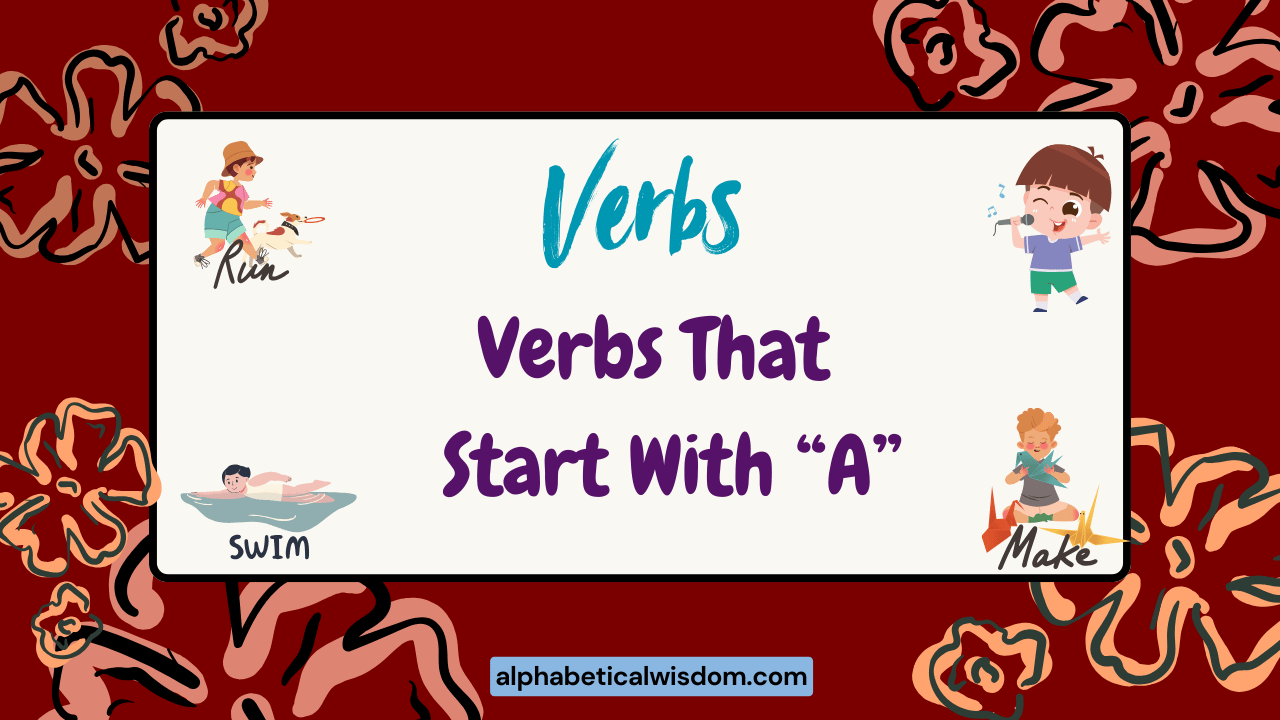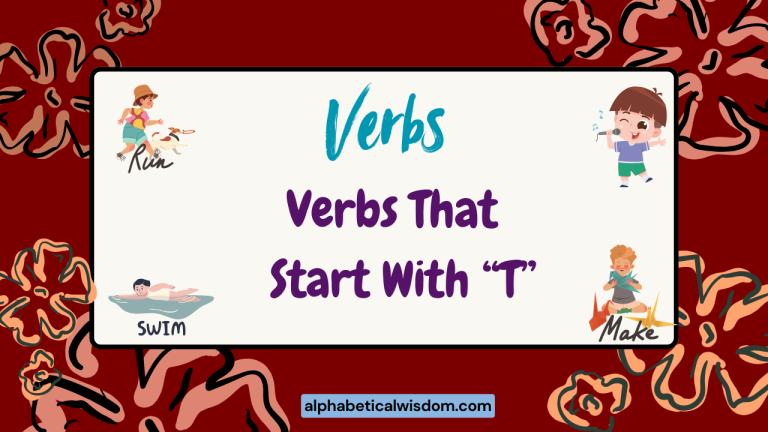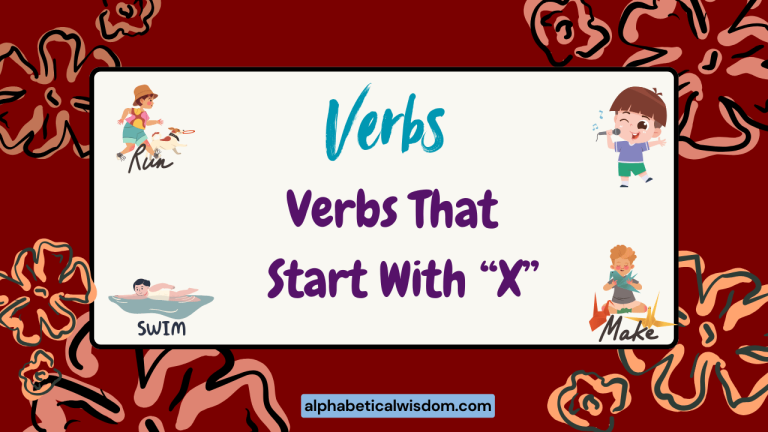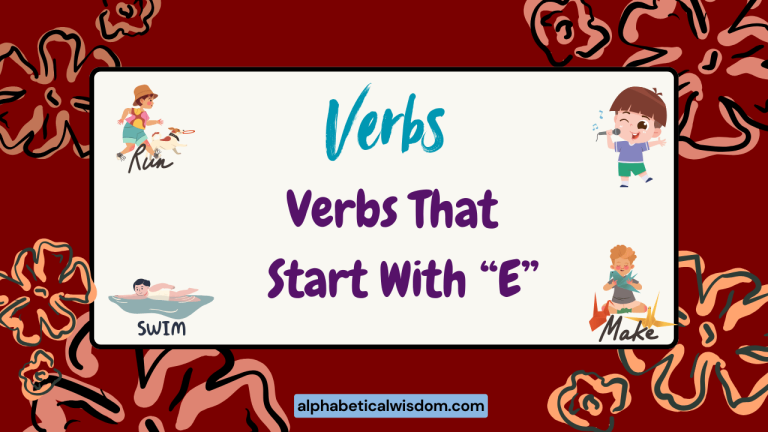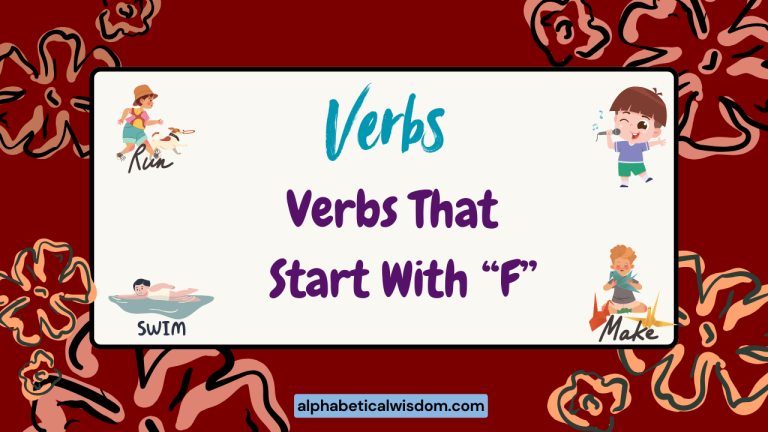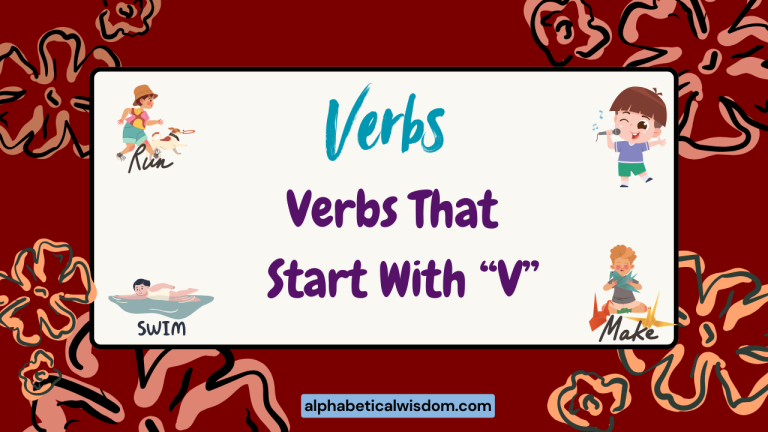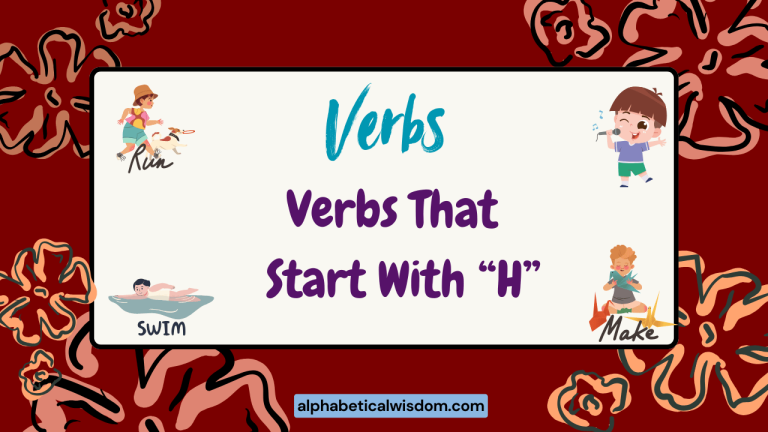Verbs That Start With A: A Comprehensive Grammar Guide
Mastering verbs is crucial for effective communication in English. Verbs that start with the letter ‘A’ are particularly interesting because they encompass a wide range of actions, states, and processes.
Understanding these verbs, their various forms, and how to use them correctly can significantly enhance your writing and speaking skills. This article provides a detailed exploration of verbs starting with ‘A’, offering definitions, examples, usage rules, and practice exercises to help learners of all levels improve their grasp of English grammar.
This guide is designed for English language learners, students, teachers, and anyone looking to refine their understanding of English grammar. By studying the concepts and examples presented, you’ll gain a deeper appreciation for the nuances of verbs starting with ‘A’ and how they contribute to the richness and complexity of the English language.
Let’s embark on this grammatical journey together!
Table of Contents
- Introduction
- Definition of Verbs Starting With A
- Structural Breakdown of Verbs
- Types and Categories of Verbs Starting With A
- Examples of Verbs Starting With A
- Usage Rules for Verbs Starting With A
- Common Mistakes with Verbs Starting With A
- Practice Exercises
- Advanced Topics
- Frequently Asked Questions
- Conclusion
Definition of Verbs Starting With A
A verb is a word that describes an action, occurrence, or state of being. Verbs are the core of any sentence, providing essential information about what the subject is doing or experiencing.
Verbs starting with the letter ‘A’ cover a wide range of meanings, from physical actions like ‘act’ and ‘attack’ to mental processes like ‘analyze’ and ‘appreciate’. They also include state-of-being verbs such as ‘appear’ and ‘arise’.
The function of a verb is to indicate what the subject of a sentence is doing, feeling, or being. Verbs can be classified based on their role in a sentence, such as action verbs, linking verbs, and auxiliary verbs.
Understanding the different types of verbs helps in constructing grammatically correct and meaningful sentences. The context in which a verb is used determines its specific meaning and how it interacts with other words in the sentence.
For example, the verb “add” can mean to include something, to perform mathematical addition, or to provide further information.
Verbs starting with ‘A’ are found in various contexts, including everyday conversations, academic writing, and formal speeches. Their versatility and wide range of meanings make them essential for effective communication.
By studying these verbs, learners can expand their vocabulary and improve their ability to express themselves clearly and accurately.
Structural Breakdown of Verbs
The structure of a verb involves its different forms, which indicate tense, aspect, mood, and voice. Every verb has a base form (also known as the infinitive without “to”), a past tense form, a past participle form, and a present participle form.
For regular verbs, the past tense and past participle are formed by adding ‘-ed’ to the base form. However, many verbs starting with ‘A’ are irregular, meaning their past tense and past participle forms do not follow this simple rule.
For example, the verb “arise” has the following forms: base form – arise, past tense – arose, past participle – arisen, and present participle – arising. Understanding these forms is crucial for using verbs correctly in different tenses and contexts.
The present participle is always formed by adding ‘-ing’ to the base form of the verb. Additionally, verbs can be modified by auxiliary verbs (also known as helping verbs) to form different tenses and moods.
For instance, “am acting,” “was acting,” and “will act” all use the auxiliary verbs “am,” “was,” and “will” to modify the verb “act.”
Additionally, verbs can be used in active and passive voice. In the active voice, the subject performs the action (e.g., “The student answered the question”).
In the passive voice, the subject receives the action (e.g., “The question was answered by the student”). Understanding the structural elements of verbs allows for precise and effective communication.
Types and Categories of Verbs Starting With A
Verbs starting with ‘A’ can be categorized based on their function and meaning within a sentence. Here are some common categories:
Action Verbs
Action verbs describe what the subject of the sentence is doing. They can be either transitive or intransitive.
Stative Verbs
Stative verbs describe a state of being, a condition, or a mental process rather than an action. They often relate to thoughts, emotions, senses, or possession.
Auxiliary Verbs
Auxiliary verbs (also known as helping verbs) are used with a main verb to form compound tenses, moods, and voices. Common auxiliary verbs include ‘am,’ ‘are,’ ‘is,’ ‘was,’ and ‘were’.
Transitive Verbs
Transitive verbs require a direct object to complete their meaning. The direct object receives the action of the verb.
Intransitive Verbs
Intransitive verbs do not require a direct object. The action of the verb is complete in itself.
Examples of Verbs Starting With A
Here are examples of verbs starting with ‘A’ categorized by their type:
Action Verb Examples
The following table provides examples of action verbs starting with ‘A’ used in sentences. These examples illustrate how action verbs convey specific actions performed by the subject.
| Verb | Example Sentence |
|---|---|
| Act | The actor will act in the play. |
| Attack | The dog might attack if provoked. |
| Add | Please add sugar to the tea. |
| Adjust | You should adjust the settings for better performance. |
| Administer | The nurse will administer the medication. |
| Adopt | They decided to adopt a child. |
| Advance | The army will advance at dawn. |
| Advertise | The company will advertise the new product. |
| Advise | The doctor will advise you on your diet. |
| Affect | The weather can affect your mood. |
| Afford | Can you afford to buy a new car? |
| Agree | I agree with your opinion. |
| Aid | We should aid those in need. |
| Aim | She aims to become a doctor. |
| Alarm | The sudden noise alarmed the neighbors. |
| Alert | The system will alert you to any issues. |
| Align | Make sure to align the papers properly. |
| Allege | The report alleges corruption. |
| Allocate | The budget will allocate funds to education. |
| Allow | The rules allow for some flexibility. |
| Alter | We need to alter the plans. |
| Amass | The company amassed great wealth. |
| Amuse | The comedian tried to amuse the audience. |
| Analyze | The scientist will analyze the data. |
| Announce | The president will announce the decision. |
| Answer | Please answer the question. |
| Anticipate | We anticipate a large crowd. |
| Apologize | I must apologize for the delay. |
| Appeal | The lawyer will appeal the verdict. |
| Appear | The sun will appear soon. |
Stative Verb Examples
The following table illustrates stative verbs starting with ‘A’, which describe states of being, thoughts, or feelings. These verbs generally do not take the continuous form.
| Verb | Example Sentence |
|---|---|
| Admire | I admire her courage. |
| Adore | She adores her grandchildren. |
| Appreciate | I appreciate your help. |
| Astonish | The news astonished everyone. |
| Assume | Let’s assume the best. |
| Acknowledge | I acknowledge your hard work. |
| Accept | I accept your apology. |
| Affirm | She affirms her belief in justice. |
| Abhor | I abhor violence. |
| Assess | We need to assess the situation. |
| Attest | I can attest to his honesty. |
| Ascertain | We must ascertain the facts. |
| Aspire | I aspire to be a writer. |
| Avow | He avows his innocence. |
| Aver | She avers that she is telling the truth. |
| Appall | The conditions appalled her. |
| Amuse | That story amuses me. |
| Anger | His words anger me. |
| Aggrieve | The decision aggrieved many people. |
| Alarm | The news alarmed her. |
| Amaze | Her talent amazes me. |
| Attract | Flowers attract bees. |
| Assume | I assume you know the answer. |
| Appeal | That idea appeals to me. |
| Apply | The rules apply to everyone. |
| Assess | We need to assess the risks. |
| Ascribe | They ascribe the success to hard work. |
| Attribute | We attribute the discovery to him. |
| Accredit | The university is accredited by the board. |
| Acclaim | The play was acclaimed by critics. |
Auxiliary Verb Examples
The following table shows how auxiliary verbs starting with ‘A’ are used to form different tenses and voices. Note that “am,” “are,” and “is” are forms of the verb “to be,” which is a common auxiliary verb.
| Verb | Example Sentence |
|---|---|
| Am | I am going to the store. |
| Are | They are studying for the exam. |
| Is | She is working on a project. |
| Was | He was reading a book. |
| Were | We were watching a movie. |
| Are being | The trees are being planted. |
| Is being | The house is being renovated. |
| Am being | I am being serious. |
Transitive Verb Examples
The examples below show transitive verbs that start with ‘A’ and require a direct object. The direct object receives the action of the verb.
| Verb | Example Sentence | Direct Object |
|---|---|---|
| Answer | She answered the question. | the question |
| Admire | I admire her talent. | her talent |
| Accept | He accepted the offer. | the offer |
| Advise | The doctor advised the patient. | the patient |
| Affect | The weather affects my mood. | my mood |
| Announce | The company announced the results. | the results |
| Appreciate | I appreciate your help. | your help |
| Accuse | They accused him of the crime. | him |
| Adjust | Please adjust the volume. | the volume |
| Adore | She adores her children. | her children |
| Administer | The nurse administered the medicine. | the medicine |
| Adopt | They adopted a puppy. | a puppy |
| Analyze | The scientist analyzed the data. | the data |
| Attack | The dog attacked the stranger. | the stranger |
| Assist | The assistant assisted the manager. | the manager |
| Accomplish | We accomplished the task. | the task |
| Acquire | The company acquired a new firm. | a new firm |
| Activate | Please activate the alarm. | the alarm |
| Add | She added the spices. | the spices |
| Address | He addressed the audience. | the audience |
| Allocate | They allocated the resources. | the resources |
| Allow | The rules allow this action. | this action |
| Alter | She altered the dress. | the dress |
| Amuse | The clown amused the children. | the children |
| Anticipate | We anticipate their arrival. | their arrival |
| Appoint | They appointed her as director. | her |
| Approve | The board approved the plan. | the plan |
| Argue | They argued the point. | the point |
| Arrange | She arranged the flowers. | the flowers |
| Assemble | He assembled the furniture. | the furniture |
Intransitive Verb Examples
The following table showcases intransitive verbs starting with ‘A’ that do not require a direct object. The action of the verb is complete in itself.
| Verb | Example Sentence |
|---|---|
| Arise | Problems arise unexpectedly. |
| Appear | The stars appear at night. |
| Agree | We agree on the terms. |
| Act | He acted bravely. |
| Advance | The troops advanced. |
| Arrive | They will arrive tomorrow. |
| Aspire | She aspires to greatness. |
| Awake | I awake early. |
| Accede | He acceded to their demands. |
| Adhere | The paint will adhere well. |
| Adjust | She quickly adjusted to the new environment. |
| Age | The wine ages gracefully. |
| Aim | He aims high. |
| Alight | The bird alighted on the branch. |
| Amble | They ambled through the park. |
| Answer | The door answered. |
| Appertain | These rules appertain to everyone. |
| Apply | The rules apply here. |
| Approach | Winter is approaching. |
| Assent | They assented to the proposal. |
| Attend | She will attend the meeting. |
| Atrophy | Muscles can atrophy from disuse. |
| Attune | We need to attune ourselves to the new reality. |
| Auction | The painting will auction next week. |
| Augment | The rain will augment the river’s flow. |
| Avenge | He sought to avenge his brother. |
| Avouch | I can avouch for his honesty. |
| Await | We await your response. |
| Awe | The view awed her. |
| Awn | The wheat awned in the sun. |
Usage Rules for Verbs Starting With A
Using verbs correctly involves following several grammatical rules. Here are some key rules to keep in mind:
Subject-Verb Agreement
The verb must agree in number with its subject. Singular subjects take singular verbs, and plural subjects take plural verbs.
For example:
- Singular: The student answers the question.
- Plural: The students answer the question.
Tense Consistency
Maintain consistent tense throughout a sentence or paragraph. If you start in the past tense, generally continue in the past tense unless there is a clear reason to switch.
For example:
- Correct: She arrived late and apologized for the delay.
- Incorrect: She arrived late and apologizes for the delay.
Active vs. Passive Voice
Choose the appropriate voice based on the emphasis you want to place. Use the active voice when you want to emphasize the actor, and use the passive voice when you want to emphasize the action or the receiver of the action.
For example:
- Active: The chef added the spices.
- Passive: The spices were added by the chef.
Irregular Verb Forms
Many verbs starting with ‘A’ are irregular and do not follow the standard ‘-ed’ rule for forming the past tense and past participle. It is essential to memorize these forms.
For example:
| Base Form | Past Tense | Past Participle |
|---|---|---|
| Arise | Arose | Arisen |
| Awake | Awoke/Awakened | Awoken/Awakened |
Common Mistakes with Verbs Starting With A
Here are some common mistakes learners make when using verbs starting with ‘A’, along with corrections:
| Incorrect | Correct | Explanation |
|---|---|---|
| I am agree with you. | I agree with you. | “Agree” is a stative verb and does not typically use the continuous form. |
| She is admire his work. | She admires his work. | “Admire” is a stative verb and does not typically use the continuous form. |
| He has arose early. | He has arisen early. | The past participle of “arise” is “arisen,” not “arose.” |
| They was arrive late. | They were arriving late. | The verb “was” does not agree with the plural subject “they”. |
| The problem was arose. | The problem arose. | “Arose” is the past tense, not the past participle, and “arise” is intransitive, so passive voice is incorrect. |
| The car is needing adjust. | The car needs adjusting. | “Adjust” is not typically used in continuous tenses when referring to needs. |
| I am appreciating your help. | I appreciate your help. | “Appreciate” is a stative verb and is rarely used in the continuous form. |
| She is always angering easily. | She angers easily. | “Anger” as a verb is usually not used in the continuous form to describe a general trait. |
| He is seeming agree. | He seems to agree. | “Seem” is a stative verb. |
| We are assume it will rain. | We assume it will rain. | “Assume” is a stative verb. |
Practice Exercises
Test your understanding of verbs starting with ‘A’ with these exercises:
Exercise 1: Fill in the blanks with the correct form of the verb.
| Question | Answer |
|---|---|
| 1. The sun usually _______ (appear) in the morning. | appears |
| 2. I _______ (admire) her dedication to her work. | admire |
| 3. They _______ (announce) the winner of the competition yesterday. | announced |
| 4. We _______ (anticipate) a large crowd at the event. | anticipate |
| 5. The problem _______ (arise) due to a misunderstanding. | arose |
| 6. The doctor _______ (advise) him to rest. | advised |
| 7. She _______ (accept) the award with gratitude. | accepted |
| 8. I _______ (am) going to the park later. | am |
| 9. The company _______ (acquire) a new subsidiary last year. | acquired |
| 10. The students _______ (are) studying diligently. | are |
Exercise 2: Identify the type of verb (action, stative, auxiliary) in each sentence.
| Question | Answer |
|---|---|
| 1. I admire her courage. | Stative |
| 2. She is reading a book. | Auxiliary + Action |
| 3. They attack the enemy. | Action |
| 4. We are going to the beach. | Auxiliary + Action |
| 5. He aspires to be a doctor. | Stative |
| 6. The music amuses me. | Stative |
| 7. The nurse administered the medicine. | Action |
| 8. I am being serious. | Auxiliary |
| 9. The alarm alerted everyone. | Action |
| 10. They are studying hard. | Auxiliary + Action |
Exercise 3: Rewrite the following sentences in the passive voice.
| Question | Answer |
|---|---|
| 1. The chef added the spices. | The spices were added by the chef. |
| 2. The students answered the question. | The question was answered by the students. |
| 3. The company announced the results. | The results were announced by the company. |
| 4. The dog attacked the stranger. | The stranger was attacked by the dog. |
| 5. The nurse administered the medicine. | The medicine was administered by the nurse. |
| 6. The artist painted the picture. | The picture was painted by the artist. |
| 7. The teacher explained the lesson. | The lesson was explained by the teacher. |
| 8. The police arrested the thief. | The thief was arrested by the police. |
| 9. The builder constructed the house. | The house was constructed by the builder. |
| 10. The author wrote the book. | The book was written by the author. |
Advanced Topics
For advanced learners, here are some more complex aspects of verbs starting with ‘A’:
Phrasal Verbs with ‘A’
Phrasal verbs consist of a verb and a preposition or adverb, creating a new meaning. For example:
- Act up: behave badly (The children started to act up.)
- Add up: make sense (His story doesn’t add up.)
- Answer for: be responsible for (He will have to answer for his actions.)
Subjunctive Mood with ‘A’ Verbs
The subjunctive mood expresses a wish, suggestion, or condition that is contrary to fact. Some verbs starting with ‘A’ can be used in the subjunctive mood.
For example:
- It is essential that he attend the meeting.
- I suggest that she apply for the job.
Frequently Asked Questions
- What is the difference between a transitive and an intransitive verb?
A transitive verb requires a direct object to complete its meaning, while an intransitive verb does not. For example, “She answered the question” (transitive) vs. “Problems arise unexpectedly” (intransitive).
- How can I identify a stative verb?
Stative verbs describe a state of being, a condition, or a mental process rather than an action. They often relate to thoughts, emotions, senses, or possession and are generally not used in continuous tenses. Examples include “admire,” “appreciate,” and “assume.”
- What are auxiliary verbs, and how are they used?
Auxiliary verbs (also known as helping verbs) are used with a main verb to form compound tenses, moods, and voices. Common auxiliary verbs include ‘am,’ ‘are,’ ‘is,’ ‘was,’ and ‘were’. For example, “I am going to the store.”
- Why is subject-verb agreement important?
Subject-verb agreement ensures that the verb matches the number of the subject (singular or plural). This is crucial for grammatical correctness and clarity. For example, “The student answers the question” (singular) vs. “The students answer the question” (plural).
- What should I do if I’m unsure about the correct form of an irregular verb?
Consult a dictionary or grammar guide to find the correct past tense and past participle forms. Memorizing common irregular verb forms is also helpful.
Conclusion
Verbs starting with the letter ‘A’ are a vital component of the English language, offering a rich array of meanings and functions. By understanding their definitions, structural forms, and usage rules, learners can significantly improve their communication skills.
This guide has provided a comprehensive overview of these verbs, complete with examples, exercises, and advanced topics to deepen your knowledge.
Mastering verbs starting with ‘A’ not only enhances your grammatical accuracy but also empowers you to express yourself more clearly and effectively. Whether you are writing an academic paper, delivering a speech, or engaging in everyday conversation, a strong command of these verbs will undoubtedly elevate your language proficiency.
Continue practicing and exploring the nuances of English grammar to unlock your full potential as a communicator.
